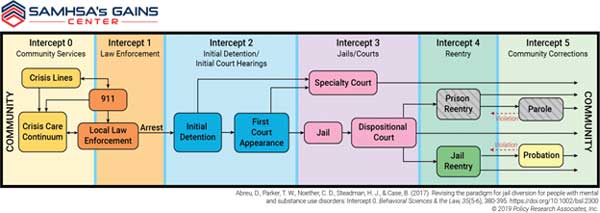For those court and justice partners unfamiliar with the Sequential Intercept Model (SIM), or in need of a brief refresher, the SIM was originally developed over several years in the early 2000s by Policy Research Associates, in conjunction with the SAMHSA’s GAINS Center for Behavioral Health and Justice.
Since its development, the SIM has been used as a focal point for states and communities to assess resources, identify gaps in services, align systems, and plan for comprehensive behavioral health and justice programming.
In alignment with the cross-sector collaborative foundation promoted within the Illinois Mental Health Task Force Action Plan, the SIM emphasizes a multi-disciplinary approach that crosses over systems, including mental health, substance abuse, law enforcement, pre-trial services, courts, jails, community corrections, housing, health, social services, peers, and even family members, as all have an investment in the justice process and in public health and safety outcomes.
Intercepts 0 and 1 focus on opportunities to divert and deflect people away from justice system involvement through local crisis care services, 911 operators, and law enforcement and behavioral health collaborations. The intent of these early intercepts is to provide the most appropriate response and responder, and when applicable, to connect people with treatment or services in lieu of arrest.

By now, we have all heard about 988 (Intercept 0), the three-digit number for the National Suicide Prevention Lifeline, a network of crisis centers that provide 24/7, confidential support to people in suicidal crisis or mental health-related distress. 988 holds the promise of providing people with access to care and support that may alleviate criminal justice system contacts. [SB1]
Progressing to Intercept 1 of the SIM, in 2021, Illinois Governor J.B. Pritzker signed into law the Community Emergency Services and Supports Act (CESSA), also known as the Stephon Watts Act. This legislation requires emergency response operators such as those at 911 centers, to refer calls seeking mental and behavioral health support to a service that can dispatch a team of mental health professionals when a law enforcement response may not be deemed necessary. This marks a significant change in policy and the implementation details are tasked to the Secretary of the Department of Human Services, who is working in concert with the 911 Administrator at the Illinois State Police, the EMS administrators under the purview of the Illinois Department of Public Health, and Statewide and Regional Advisory Committees to effectuate the new law.
Per Implementation of the 988 Suicide and Crisis Lifeline: What Court Leaders Need to Know, a document approved by the Executive Committee of the National Judicial Task Force to Examine State Courts’ Response to Mental Illness:
“Court leaders should proactively advocate for implementation models that include a focus on deflection from unnecessary law enforcement involvement and diversion from inappropriate justice system penetration. Courts are ill-equipped to respond effectively to the breadth and depth of issues that accompany people with serious mental illness who do not otherwise need to be in the court system. To the extent that those in that circumstance can be deflected from unnecessary court involvement public safety will improve, successful outcomes will increase, and court resources will be better used.”
While this is an exciting time with multiple efforts seeking to reimagine the “early intercepts” it will take time to realize the full vision of these efforts.
To sign up for Communications from the Division of Mental Health regarding 988 and/or the Community Emergency Services and Support Act (CESSA) please complete the request form at: https://forms.office.com/g/Da9MEQE8Hb